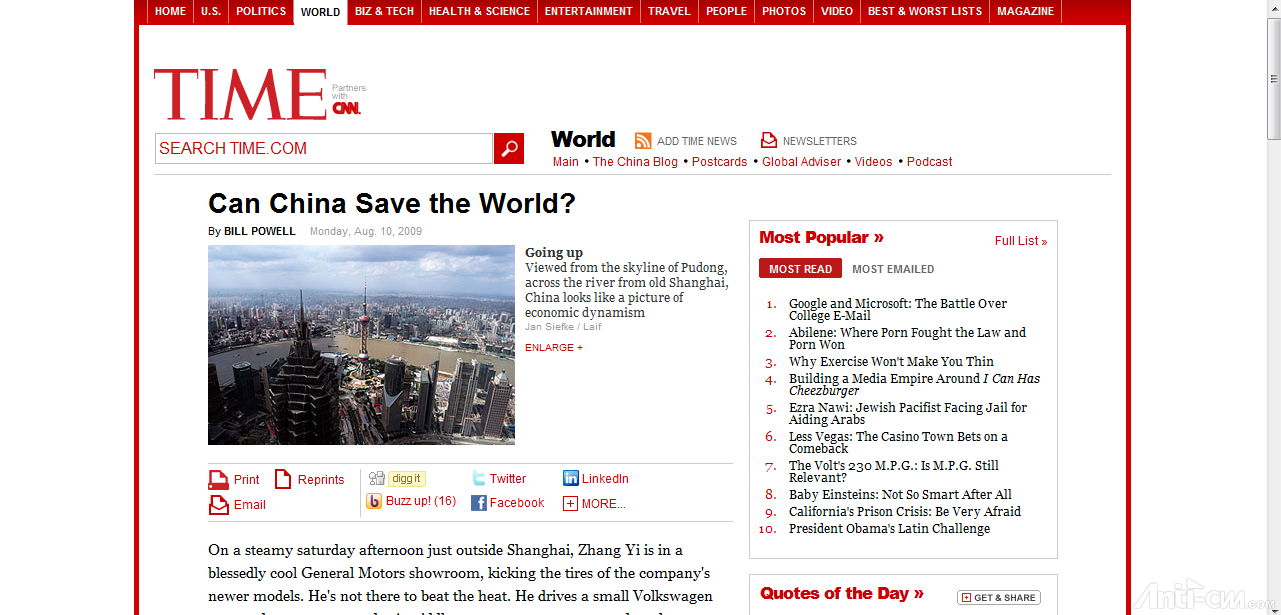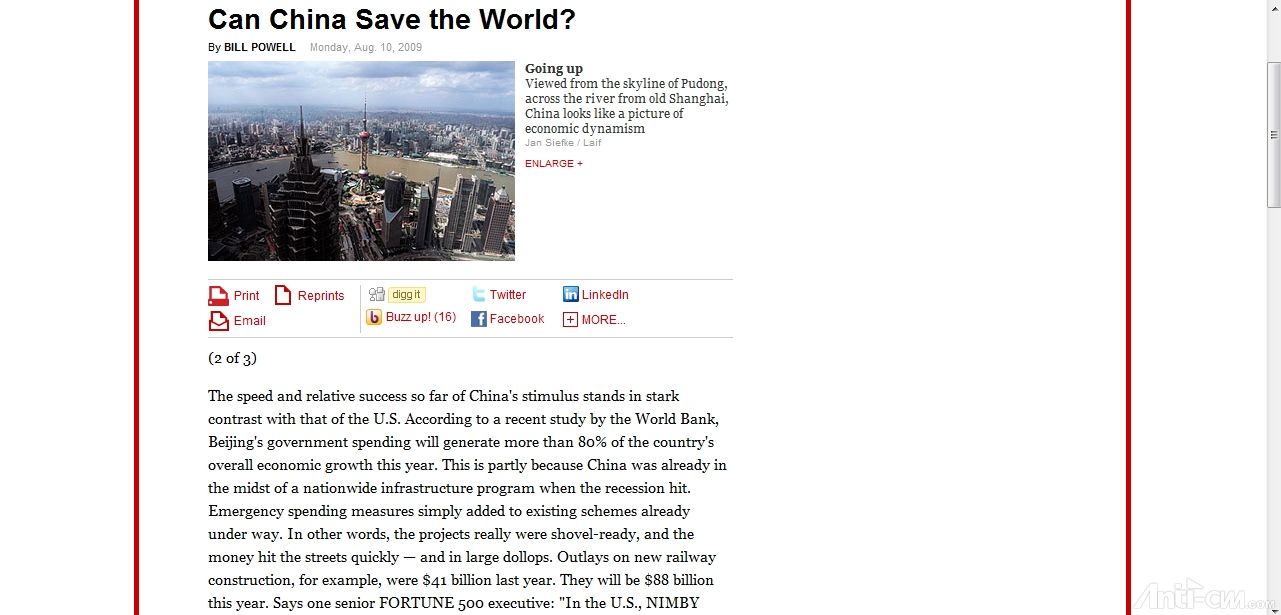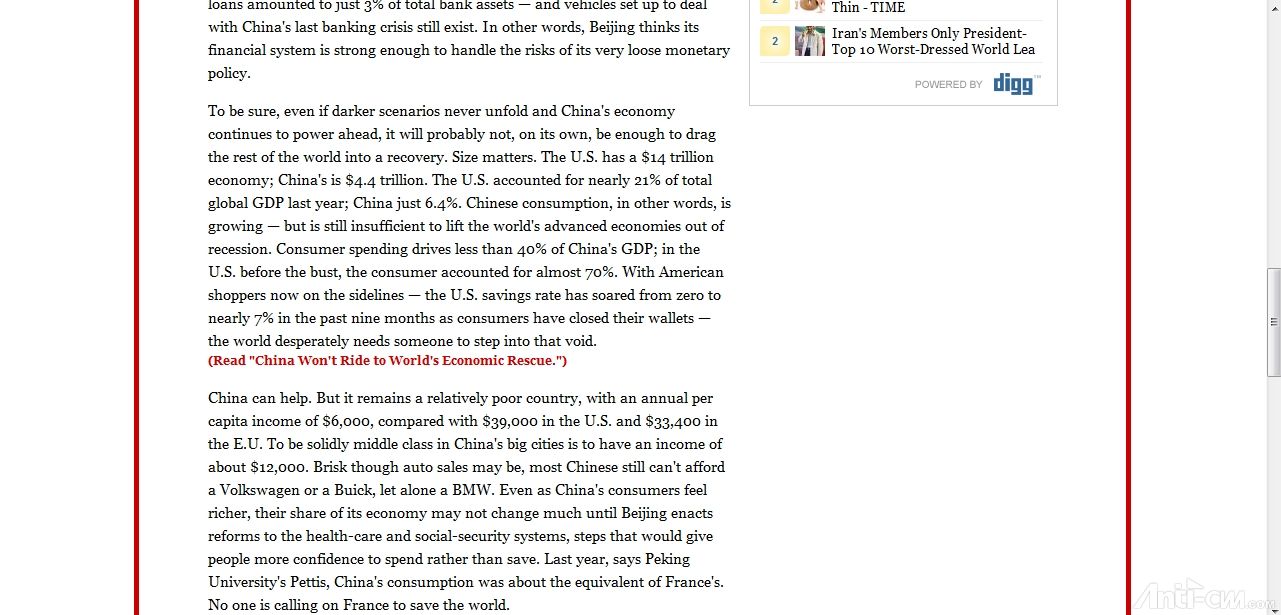|
|
本帖最后由 vivicat 于 2009-8-16 14:33 编辑
Can China Save the World?
http://www.time.com/time/magazine/article/0,9171,1913638-1,00.html
By Bill Powell Monday, Aug. 10, 2009
On a steamy saturday afternoon just outside Shanghai, Zhang Yi is in ablessedly cool General Motors showroom, kicking the tires of thecompany's newer models. He's not there to beat the heat. He drives asmall Volkswagen now and wants to upgrade. A middle manager at astate-owned steel company, Zhang has no worries about his job orChina's economy. "Things are still pretty good," he says. "I have noproblem now affording one of these," nodding toward the array ofgleaming new Buicks nearby.
There aren't a lot of places in the world these days where consumersspeak with that kind of confidence. With the U.S., Japan and all ofEurope mired in the worst global recession in 30 years, China has showna restorative strength that six months ago many doubted it had. Adevastating slump in exports crippled growth late last year, but on theback of a $586 billion government stimulus program — about 13% of GDP,spread over two years — China has snapped back. The economy grew 7.9%in the second quarter and will now probably expand 8% or more thisyear. Evidence of increasing momentum appears almost every day. Factoryproduction has begun to edge up, in part because Chinese consumerscontinue to spend money at a healthy pace. Auto sales, helpedsignificantly by government subsidies for small-car purchases, hit anall-time record in April and will easily surpass those in the U.S. thisyear. Overall, retail sales in China this year are up 16%.
Numbers alone do not capture the sense that the balance of globaleconomic power is shifting eastward. There have been several momentsthat seemed to crystallize the zeitgeist, none more memorable than U.S.Treasury Secretary Timothy Geithner's speech in June before the bestand the brightest at Peking University, the Harvard of China. Not longago, students there would have been the most respectful and polite ofaudiences. Yet when Geithner tried to reassure one questioner thatChina's investments in U.S. government debt were "very safe," theresponse was perhaps an indication of the onset of a new economicorder: the students laughed.
The U.S., the unquestioned leader of the global economy, is now in themidst of a disorienting shift in economic policy, away from thelet-it-rip form of capitalism that has guided it for almost 30 yearsand toward more overt government control and regulation of huge swathsof the economy. No one yet can safely say whether this is wise, but inthe U.S. it is certainly the stuff of increasingly fierce debate. Nosuch doubts are evident in China, where the government reacted to thecrisis with alacrity and the economy is now responding in kind.
That's why, for global companies like General Motors, China is nolonger the future. It's the present. Of the world's 10 biggesteconomies, China's is the only one that is growing, and it could soonsurpass Japan's to become the world's second largest. The Shanghaiexchange has soared more than 80% this year, by far the bestperformance among major markets. Nations that depend on producingcommodities, such as Australia and Brazil, have benefited immenselyover the past six months as demand from China has driven up the priceof raw materials. Helped by trade with China, Asia's export-driveneconomies are sputtering back to life. Overall, the InternationalMonetary Fund (IMF) forecasts that in the three years from 2008 to2010, China will, astonishingly, account for almost three-quarters ofthe world's economic growth. Not surprisingly, China has now become thefocus of a world that is looking for a way out of the swamp. AsShanghai-based economist Andy Xie puts it, "Everyone wants to know thesame thing: Can China save the world?"
Trading Places
A few years ago, that question — and the notion that China could driveglobal growth — would have seemed absurd. After all, China's economywas dependent on manufacturing, which was in turn dependent on demandfrom the U.S., the world's undisputed economic locomotive. But thatengine remains sidetracked. The IMF predicts the U.S. economy willcontract 2.6% this year. American home prices continue to fall in somecities, while the unemployment rate has soared to 9.5%, the highestsince 1983. The U.S.'s much ballyhooed stimulus plan has so far yieldedlittle measurable benefit, save putting some spark back in stockmarkets. The absence of real signs of recovery has Washingtondiscussing the possibility of yet another round of stimulus spending,despite a ballooning federal budget deficit.
The speed and relative success so far of China's stimulus stands instark contrast with that of the U.S. According to a recent study by theWorld Bank, Beijing's government spending will generate more than 80%of the country's overall economic growth this year. This is partlybecause China was already in the midst of a nationwide infrastructureprogram when the recession hit. Emergency spending measures simplyadded to existing schemes already under way. In other words, theprojects really were shovel-ready, and the money hit the streetsquickly — and in large dollops. Outlays on new railway construction,for example, were $41 billion last year. They will be $88 billion thisyear. Says one senior FORTUNE 500 executive: "In the U.S., NIMBY [notin my backyard] is still the order of the day, whereas in China it'smore like IMBY. They build where they want, when they want. And theymove fast."
China's recovery and growing economic importance have led some tosuggest that global institutions such as the Group of Eight — the U.S.,the U.K., Canada, France, Germany, Italy, Japan and Russia — arebecoming obsolete; that the only dialogue that really matters goingforward is the conversation between the "G-2": China and the U.S. OnJuly 27, President Barack Obama appeared to acknowledge this when,addressing participants in high-level talks between the two countries,he said Washington's relationship with Beijing would "shape the 21stcentury." In recent months, Beijing has started to throw its weightaround. China seeks — and will almost certainly soon get — greatervoting rights in the IMF. In June, China agreed to buy up to $50billion in bonds issued by the IMF to boost the fund's capacity to dealwith the global financial crisis. Earlier this year, Chinese leaders,worried about the strength of the U.S. dollar and the safety of theirown $763.5 billion investment in U.S. Treasury Department debt, calledfor the creation of an alternative to the greenback as a global reservecurrency. More recently, Beijing has signaled an intention to slowlyestablish its own currency, the renminbi, as a dollar alternative ininternational trade by providing subsidies for Chinese companies toprice their exports in renminbi. One economist, Qu Hongbin of HSBC inHong Kong, goes so far as to say that 40% to 50% of China's overalltrade flows could be settled in renminbi by 2012 (though few othereconomists believe this will happen anywhere near that fast). Thiswillingness to make its positions known publicly and push othergovernments to see things China's way "is very different from 10 yearsago, when Beijing was much quieter and more low-profile," says Jun Ma,an economist at Deutsche Bank in Hong Kong.
Indeed, China is increasingly open about both its ambitions and itsconcerns over U.S. economic policy, given its position as Washington'slargest foreign creditor. Beijing never signed on to what became knownin the late 1990s as the Washington Consensus on global economicpolicy, which called for free trade, privatization, light-touchregulation, prudent fiscal policies and — at least as many interpretedthe consensus — free capital flows. The U.S. Treasury, in the wake ofthe credit meltdown, has put forward a plan to enhance regulation ofits own capital markets, but that is unlikely to prevent Beijing fromcontinuing to push for the IMF to take a greater role in policingglobal markets. At its core, despite embracing many aspects of themarket, China runs a top-down, command-and-control economy, and itssuccess so far in skating through the recession relatively cleanly mayencourage other developing countries to adopt its brand of capitalism.
Not So Fast
still, the best possible answer to the question of whether China cansave the world is: Not yet. Plenty of economists doubt that China'seconomy is as sound as it appears or truly on the road to a sustainedrecovery. And many more dismiss the chatter about China as the world'seconomic savior as hopelessly premature.
China's overall economic vigor may continue to impress, but there arequestions surrounding the quality of its performance. The People's Bankof China, the central bank, is giving great gobs of money tostate-owned banks that, with Beijing's forceful encouragement, arelending to state-owned companies participating in infrastructureconstruction. Skeptics are frightened by the amount of cash beingshoveled out the doors. The central bank recently announced that newloans in June totaled $224 billion. That was more than double theprevious month's amount and brought new bank lending in the first sixmonths of the year to nearly $1.1 trillion, exceeding the total for allof 2008.
To optimists, the June data showed just how determined the Chinesegovernment is to implement effective monetary countermeasures to fightthe downturn. As Peking University finance professor Michael Pettissays, China is "throwing everything including the kitchen sink'' at theproblem. There is no question that as a result of the flood offinancing, a lot of Chinese have jobs they otherwise wouldn't. But, as Grant's Interest Rate Observer,an influential Wall Street newsletter, points out in its latest issue,"Massive injections of money and credit ... are always bullish beforethey are bearish." The newsletter draws worrying parallels betweenChina's current credit boom and the gush of lending that produced theU.S. housing bubble, the collapse of which devastated the financialsector and triggered the global credit crisis and current recession.
There are certainly signs that some aspects of China's recovery areephemeral. Part of the reason China's stock market has soared is thatChinese companies have received so much cheap financing that they havedumped proceeds into the equity market for lack of better alternatives.Andrew Barber, Asia strategist at Research Edge, a New Haven, Conn.,investment-research firm, estimates that up to 30% of new bank lendingthis year has wound its way into equities. Why isn't the money goinginto new businesses? The evidence suggests that in key parts of theeconomy growth remains anemic, particularly the importantexport-manufacturing sector, which continues to suffer from thereduction in global demand. According to a report from Fitch Ratings inthe U.S., Chinese lending continues to accelerate even though corporateprofits overall are shrinking — suggesting that China may be incubatingits own financial crisis that could be triggered when the adrenal rushof the stimulus wears off.
Little Big China
Those caveats are important. But China's technocrats are well aware ofthe risks they are running. "They came into this [crisis period] witheyes wide open," says Barber, recognizing that loans being granted in arelatively weak economic climate could start to go bad in droves. Thecountry's once shaky financial sector was cleaned up several years ago— in 2007, nonperforming loans amounted to just 3% of total bank assets— and vehicles set up to deal with China's last banking crisis stillexist. In other words, Beijing thinks its financial system is strongenough to handle the risks of its very loose monetary policy.
To be sure, even if darker scenarios never unfold and China's economycontinues to power ahead, it will probably not, on its own, be enoughto drag the rest of the world into a recovery. Size matters. The U.S.has a $14 trillion economy; China's is $4.4 trillion. The U.S.accounted for nearly 21% of total global GDP last year; China just6.4%. Chinese consumption, in other words, is growing — but is stillinsufficient to lift the world's advanced economies out of recession.Consumer spending drives less than 40% of China's GDP; in the U.S.before the bust, the consumer accounted for almost 70%. With Americanshoppers now on the sidelines — the U.S. savings rate has soared fromzero to nearly 7% in the past nine months as consumers have closedtheir wallets — the world desperately needs someone to step into thatvoid.
China can help. But it remains a relatively poor country, with anannual per capita income of $6,000, compared with $39,000 in the U.S.and $33,400 in the E.U. To be solidly middle class in China's bigcities is to have an income of about $12,000. Brisk though auto salesmay be, most Chinese still can't afford a Volkswagen or a Buick, letalone a BMW. Even as China's consumers feel richer, their share of itseconomy may not change much until Beijing enacts reforms to thehealth-care and social-security systems, steps that would give peoplemore confidence to spend rather than save. Last year, says PekingUniversity's Pettis, China's consumption was about the equivalent ofFrance's. No one is calling on France to save the world.
China faces enormous challenges — a massive shift of population fromrural areas to cities, cleaning up decades of environmentaldegradation, continuing to provide the increase in prosperity that hasunderpinned political stability. Given their scale, it should surprisenobody that it is still most concerned with saving itself economically— not anyone else. Beijing is most unnerved by the prospect of laborunrest of the sort that resulted in the death on July 24 of asteel-company executive in northeast China at the hands of a mob.
But the resilience of the Chinese economy is no mirage. If Beijing cancome through the global crisis without an economic meltdown of its own,its leaders' reputation and confidence will be boosted. An economicmodel that survives the worst downturn since the Great Depression willhave undeniable appeal in the developing world, at a time when theWashington Consensus is thoroughly shot. Beijing, before the crisis,was already rising, its global reach and influence expanding. As therest of the world falters, that is truer than ever. China is not yetthe leader of the global economy. But it's getting there.
— with Reporting by Austin Ramzy / Beijing



|
Can, China, save, TIME, World, Can, China, save, TIME, World, Can, China, save, TIME, World
评分
-
1
查看全部评分
-
|